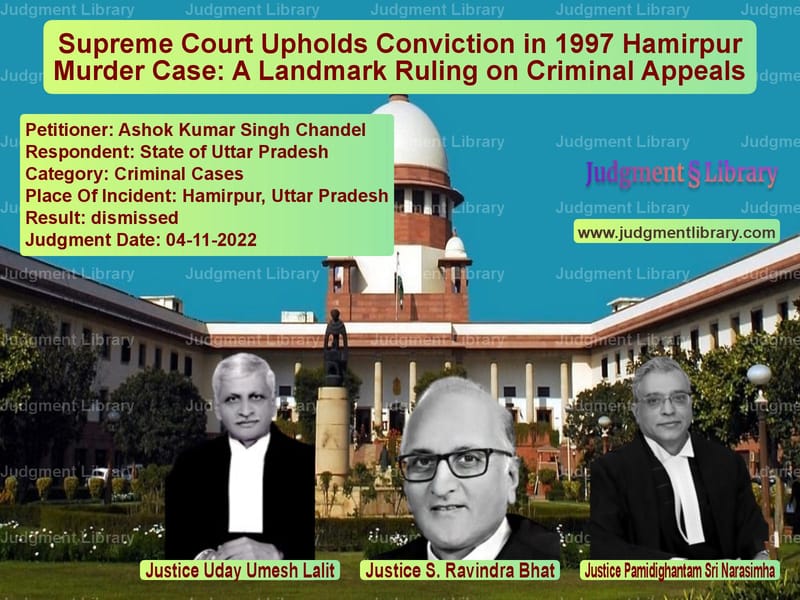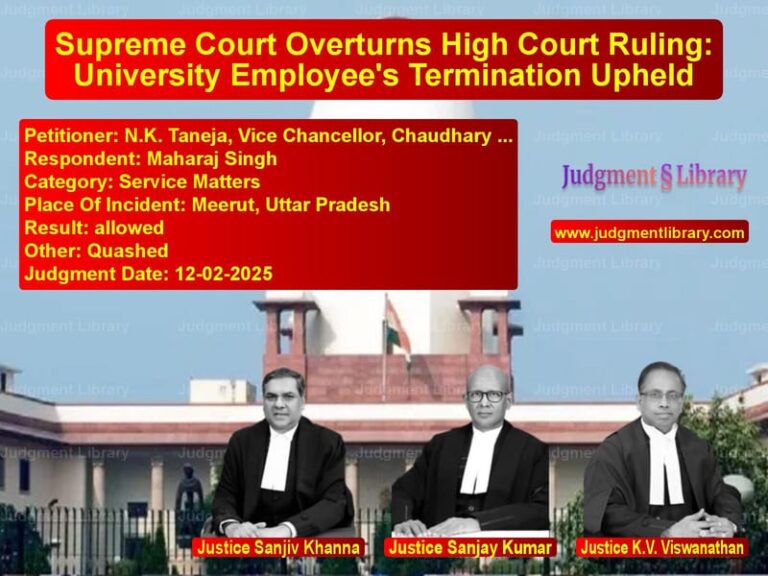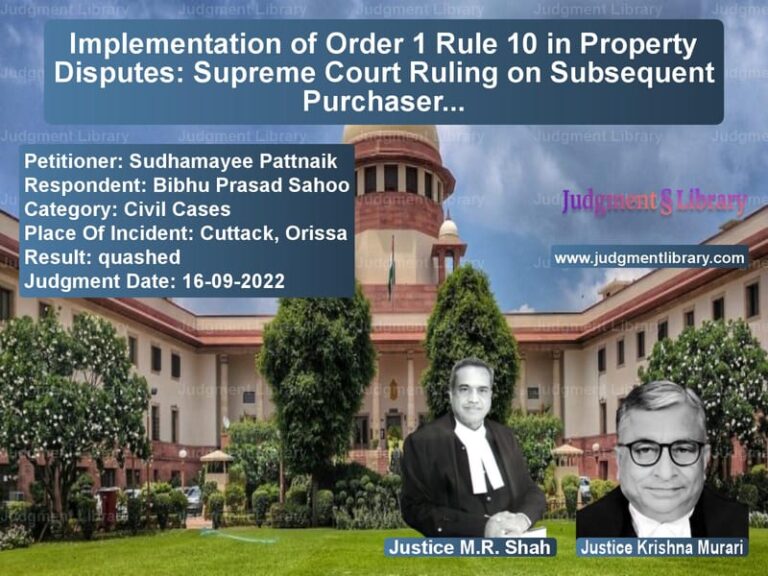Supreme Court Upholds Conviction in 1997 Hamirpur Murder Case: A Landmark Ruling on Criminal Appeals
The Supreme Court of India has delivered a significant ruling in the case of Ashok Kumar Singh Chandel vs. State of Uttar Pradesh, concerning a gruesome multiple murder that took place in 1997 in Hamirpur, Uttar Pradesh. The case has undergone extensive judicial scrutiny, with the trial court initially acquitting the accused, a decision later overturned by the Allahabad High Court. The Supreme Court has now upheld the conviction of seven accused individuals under relevant sections of the Indian Penal Code (IPC), reinforcing the legal principles surrounding criminal conspiracies and unlawful assemblies.
The ruling provides a detailed analysis of the standard of proof required in criminal cases, the evidentiary value of eyewitness testimony, and the application of legal principles under Sections 148, 302 read with 149, and 307 read with 149 of the IPC. This landmark decision also reiterates the Supreme Court’s stance on appellate jurisdiction in cases where the High Court reverses an acquittal.
Background of the Case
The case revolves around a longstanding political rivalry between factions led by Ashok Kumar Singh Chandel and the Shukla family. The victims included two brothers, one of their minor sons, and two close associates. The prosecution contended that the attack was meticulously planned and executed with the intent of eliminating members of the Shukla family.
According to the prosecution, on the day of the incident, the accused individuals, armed with firearms, ambushed the victims and fired indiscriminately. Five individuals lost their lives in the attack, while others sustained grievous injuries. The trial court, citing lack of evidence, acquitted all the accused, a decision that was overturned by the Allahabad High Court, leading to their conviction and sentencing to life imprisonment.
Arguments by the Parties
Appellant (Ashok Kumar Singh Chandel & Others)
- Argued that the trial court had correctly acquitted them based on the lack of direct evidence.
- Claimed that the eyewitness testimonies were unreliable and suffered from inconsistencies.
- Contended that the case was politically motivated and aimed at framing them due to their influence in the region.
- Submitted that the High Court erred in reversing the acquittal without sufficient justification.
Respondent (State of Uttar Pradesh)
- Argued that the High Court had rightly reversed the acquittal by correctly appreciating the evidence.
- Submitted that the testimonies of injured eyewitnesses (PW-1 and PW-2) were consistent and supported by medical evidence.
- Highlighted that forensic reports corroborated the ballistic findings linking the recovered weapons to the crime scene.
- Contended that the trial court had erred in ignoring crucial pieces of evidence, leading to an erroneous acquittal.
Key Observations by the Supreme Court
The Supreme Court meticulously examined the findings of both the trial court and the High Court. The Court emphasized that the principle of presumption of innocence does not prevent an appellate court from reversing an acquittal if the evidence clearly establishes guilt.
In its analysis, the Court made the following key observations:
- Eyewitness testimonies, especially those of the injured witnesses, hold high probative value and cannot be discarded merely because of minor inconsistencies.
- The ballistic report conclusively linked the weapons used in the crime to the accused, corroborating the prosecution’s case.
- The presence of the accused at the crime scene was established beyond doubt through reliable witness accounts.
- Statements given by prosecution witnesses were consistent with medical reports detailing the injuries sustained by the victims.
The Supreme Court further stated:
“A common object may be formed by express agreement after mutual consultation, but that is by no means necessary. It may be formed at any stage by all or a few members of the assembly, and the other members may just join and adopt it.”
Final Verdict
The Supreme Court dismissed the appeal of the accused and upheld the conviction pronounced by the High Court. The final order stated:
- The conviction of all seven accused under Sections 148, 302 read with 149, and 307 read with 149 IPC was upheld.
- The appeal seeking enhancement of the sentence to the death penalty was dismissed.
- The Court emphasized that there were no mitigating circumstances warranting a reduction in the sentence.
Conclusion
This landmark judgment underscores the Supreme Court’s approach in criminal cases where an acquittal is overturned by the High Court. The ruling reiterates that appellate courts have the authority to reassess the evidence and correct errors made by lower courts, especially in cases involving violent crimes. The case sets a precedent for future matters involving organized crimes and political murders, ensuring that procedural lapses do not lead to the miscarriage of justice.
Petitioner Name: Ashok Kumar Singh Chandel.Respondent Name: State of Uttar Pradesh.Judgment By: Justice Uday Umesh Lalit, Justice S. Ravindra Bhat, Justice Pamidighantam Sri Narasimha.Place Of Incident: Hamirpur, Uttar Pradesh.Judgment Date: 04-11-2022.
Don’t miss out on the full details! Download the complete judgment in PDF format below and gain valuable insights instantly!
Download Judgment: ashok-kumar-singh-ch-vs-state-of-uttar-prade-supreme-court-of-india-judgment-dated-04-11-2022.pdf
Directly Download Judgment: Directly download this Judgment
See all petitions in Murder Cases
See all petitions in Bail and Anticipatory Bail
See all petitions in Attempt to Murder Cases
See all petitions in Fraud and Forgery
See all petitions in Custodial Deaths and Police Misconduct
See all petitions in Judgment by Uday Umesh Lalit
See all petitions in Judgment by S Ravindra Bhat
See all petitions in Judgment by P.S. Narasimha
See all petitions in dismissed
See all petitions in supreme court of India judgments November 2022
See all petitions in 2022 judgments
See all posts in Criminal Cases Category
See all allowed petitions in Criminal Cases Category
See all Dismissed petitions in Criminal Cases Category
See all partially allowed petitions in Criminal Cases Category







